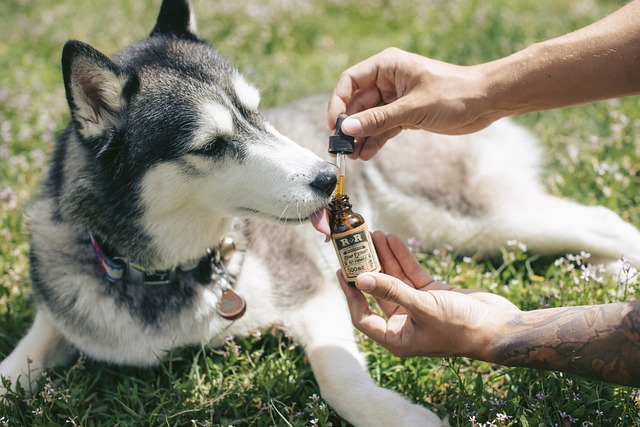Heavy Metals Testing for CBD Products: Ensuring Safety and Quality
Heavy metals testing is crucial for third-party verification of CBD products, safeguarding consumer health and building trust. Independent labs detect toxic metals like lead, mercury, and cadmium in various CBD formulations to prevent long-term health issues. This process adheres to dietary supplement guidelines, aids regulatory compliance, and ensures product quality. Reputable testing facilities use advanced instrumental methods to identify trace amounts of impurities, providing transparent results and fostering consumer confidence. Prioritizing facility reputation, methodology accuracy, and experience is key when selecting a heavy metals testing partner for CBD products, ensuring reliable and safe offerings in the growing market.
In today’s competitive market, ensuring the purity and safety of CBD products is paramount. Understanding third-party testing, particularly heavy metals testing for CBD, is essential to consumer protection and product integrity. This comprehensive guide explores the basics of third-party testing, highlights why it’s crucial for CBD, delves into the role of independent laboratories, offers tips on choosing reputable facilities, identifies common heavy metals, explains health impacts, provides best practices, and discusses future trends in this vital industry.
Understanding Third-Party Testing: The Basics

Third-party testing is a critical process in ensuring the quality and safety of products, particularly in industries like healthcare and nutrition, where consumer safety is paramount. In the context of CBD (Cannabidiol) products, heavy metals testing stands out as a crucial aspect of third-party testing. This involves independent laboratories analyzing samples from CBD oils, tinctures, edibles, and other formulations to detect the presence of any toxic heavy metals like lead, mercury, and cadmium.
Such testing is essential for several reasons. First, it guarantees that products are free from potentially harmful contaminants, which is crucial since heavy metals can accumulate in the body over time and cause various health issues. Second, third-party testing provides transparency to consumers, building trust between them and CBD brands. This assurance also helps in maintaining regulatory compliance, as many countries have specific guidelines regarding heavy metal limits in dietary supplements.
Why is Heavy Metals Testing Crucial for CBD?

Heavy metals testing is a critical component in ensuring the safety and quality of CBD (Cannabis) products. This is because heavy metals, such as lead, mercury, and arsenic, can be toxic to humans and have no known therapeutic benefits. Contamination can occur during various stages of the CBD production process, from cultivation to extraction and formulation. Even trace amounts of these metals can pose significant health risks, especially for vulnerable populations like children and the elderly.
Given the growing popularity of CBD as a healthcare supplement, consumers expect products that are free from harmful contaminants. Heavy metals testing provides assurance that CBD oils, capsules, and edibles meet safety standards. It helps manufacturers maintain consistency in product quality, build consumer trust, and comply with regulatory requirements. This proactive measure is essential for both producers and users of CBD to safeguard health and guarantee a positive experience.
The Role of Independent Laboratories in Quality Assurance

Independent laboratories play a pivotal role in ensuring the quality and safety of CBD products, particularly when it comes to heavy metals testing for CBD. These third-party testing facilities operate outside of the brands’ direct control, providing an unbiased assessment of product integrity. By conducting rigorous analyses, they verify that CBD oils, capsules, and other products are free from potentially harmful impurities like heavy metals—a critical step in maintaining consumer safety and regulatory compliance.
The process involves advanced instrumental methods to detect even trace amounts of heavy metals such as lead, mercury, and arsenic. These laboratories follow standardized protocols, ensuring consistent and accurate results. Their findings are then shared with CBD brands, allowing them to take corrective actions if needed. This transparent and comprehensive testing approach builds consumer trust, as it provides concrete evidence of product purity and quality.
How to Choose a Reputable Testing Facility

When selecting a testing facility for Heavy Metals Testing for CBD, it’s crucial to prioritize reputation and reliability. Look for facilities that are renowned for their accuracy and adherence to industry standards. Research their experience in handling cannabis products and specific tests they offer, especially those focused on heavy metals detection. Many reputable labs provide detailed information about their methodologies online, which can give you peace of mind.
Consider factors such as certification by relevant regulatory bodies, feedback from previous clients, and the transparency of their reporting processes. Ensure the facility uses advanced equipment and employs qualified technicians to guarantee precise results. Additionally, check if they maintain good communication throughout the testing process, providing clear guidance on sample submission and timely updates on test outcomes.
Common Heavy Metals Found in CBD Products

In the realm of CBD (Cannabidiol) products, ensuring product quality and safety is paramount, especially when it comes to heavy metals testing for CBD. Common heavy metals found in CBD extracts include lead, mercury, and arsenic, which can contaminate products through various stages of production and extraction. These metals are often invisible to the naked eye and require specialized techniques like atomic absorption spectroscopy or inductively coupled plasma mass spectrometry for accurate detection. Third-party testing plays a crucial role here as it provides unbiased analysis, ensuring that CBD products meet safety standards and are free from harmful contaminants.
Regular heavy metals testing for CBD is essential to protect consumers from potential health risks. Many CBD enthusiasts believe these products offer therapeutic benefits, making the need for purity and safety all the more critical. By implementing rigorous quality control measures, including heavy metals testing, manufacturers can ensure that their CBD products are not only effective but also safe for consumption, fostering trust among consumers in this rapidly growing market.
Impact of Heavy Metal Contamination on Health

Heavy metal contamination in products, including CBD oils and supplements, can have significant adverse effects on human health. These metals, such as lead, mercury, and arsenic, are toxic and can accumulate in the body over time, leading to various health issues. Exposure to heavy metals is particularly concerning for vulnerable populations like children and the elderly. Even at low levels, they can disrupt normal bodily functions, impair growth and development, and cause neurological damage.
Third-party testing plays a crucial role in ensuring product safety by accurately detecting and quantifying heavy metal impurities. Heavy Metals Testing for CBD products is essential to verify their purity and protect consumers from potential harm. This process helps maintain the quality and integrity of CBD supplements, assuring users that they are consuming safe and effective products.
Best Practices for Ensuring Product Purity and Safety

Maintaining product purity and safety is paramount in the CBD industry, especially with the rise of third-party testing. One of the critical practices involves rigorous Heavy Metals Testing for CBD products. This process helps identify and eliminate any trace elements of heavy metals like lead, mercury, or cadmium, which can be harmful to consumers. Implementing robust quality control measures at every production stage is essential to ensure consistency in product safety. Regularly updating and adhering to industry standards and regulations further strengthens this process.
Additionally, utilizing advanced analytical techniques such as Inductively Coupled Plasma Mass Spectrometry (ICP-MS) enhances the accuracy of heavy metals testing. This method allows for the detection of even minimal metal contaminants, ensuring products meet stringent purity standards. By combining these best practices with third-party testing, CBD manufacturers can build consumer trust and confidence in their product’s safety and quality.
Future Trends in CBD Third-Party Testing

As the CBD industry continues to grow, so does the need for robust and innovative testing methods. One area that is expected to see significant trends in the future is Heavy Metals Testing for CBD products. This becomes increasingly crucial as concerns about potential contaminants and heavy metal residues in cannabis-derived goods rise. Advanced techniques such as mass spectrometry and atomic absorption spectroscopy will play a pivotal role in ensuring product safety and purity, meeting stringent regulatory standards.
Furthermore, the integration of technology like artificial intelligence (AI) and machine learning algorithms could revolutionize third-party testing processes. AI can enhance data analysis, improve test accuracy, and expedite results, enabling faster market access for CBD brands. These future trends aim to not only maintain but also elevate the quality and safety standards of CBD products, fostering consumer trust and confidence in the industry.
